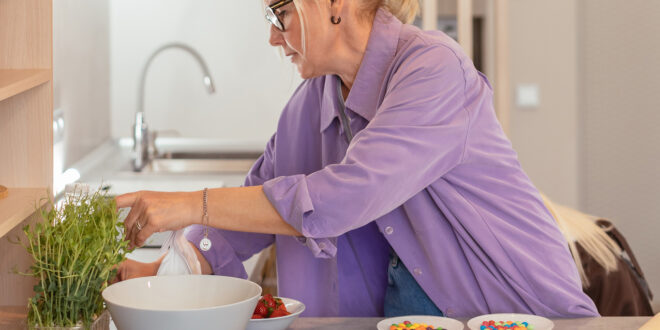Living alone can be a challenge – regardless of age. But when senior years are factored into the equation, things can become a little more demanding, especially in the kitchen. Whether you’ve always lived alone, or now do so because of changed circumstances, it pays to think ahead so, with some smart planning, you can be well nourished while saving your energy for the pastimes you really enjoy.
Nutrition
Cooking can be tiring and time consuming, but eating well is the key to maintaining good health. Reduce the load by doubling or tripling recipes, and freezing meals for times when you arrive home late, or your energy levels are low. Tip: home frozen potato doesn’t thaw well. Head to the frozen foods section of the supermarket for some potato that does (it’s delicious!).
Tempting takeaways
Don’t be afraid to rely on takeaways for a meal now and then. Some, such as Chinese and Indian meals, and fried chicken, will also freeze well. Mix and match by buying takeaways, then adding your own fresh salad and potatoes to them.
All the trimmings
Prepare a basic meal (such as meat and veg) yourself, but buy in the trimmings. Cheese sauces, parsley sauces, ready-made gravy, and custard can all be purchased at the supermarket, and can make your home-cooked meals even more special, without any extra effort on your part.
Eating out
It’s fun to dine out with friends, and it doesn’t need to be expensive when you head to the likes of a food court for a hot mid-day meal. With a simple salad sandwich or cheese roll for dinner in the evening, you’ll have created a stress-free day!
Deli delights
Cooking a roast or baking a ham is a big undertaking (not to mention the electricity involved). Make use of your supermarket or local deli to buy sliced meats that can be enjoyed cold with easy-to-prepare new potatoes and salad, or heated with a purchased gravy to accompany microwaved veges.
Cutting corners
If your hands aren’t as strong as they once were, or arthritis is a problem, you can still enjoy fresh vegetables by purchasing them pre-cut from the fresh foods section of the supermarket. If you have whole pumpkins to deal with, or root veges from your own garden, harvest and wash them ahead of time when you know family will be visiting. Ask them to do the chopping for you while you enjoy chatting together. Store the veges in the fridge, and then blanch (or cook) and freeze the produce once your visitors have gone.
Meals not on wheels
Meals on wheels is a great option – but only when you feel you’re ready for them. Until you are, slip the odd supermarket frozen meal into your freezer for days when you don’t feel like cooking or simply want a change. Frozen supermarket meals are often in a separate ‘ready-meal’ freezer rather than being with regular frozen goods.
Easi-peasi
Just because a meal is super-simple to prepare and has only 4 ingredients, doesn’t mean its not brimming over with goodness. Be kind to yourself by purchasing, or sourcing from the library, 4-ingredient recipe books, or looking online for 4-ingredient meals like these. Trying new recipes can also stimulate an appetite that has become less active as you’ve grown older.
Grab a gadget
The simplicity of bench-top appliances can beat oven baking or stove-top cooking hands down. These gadgets not only perform perfectly almost every time, but with their non-stick surfaces, a wipe out with a paper towel is often all they require before they can be popped back in the cupboard. So forget scrubbing roasting dishes and soaking baking trays, and look out for the likes of slow cookers, muffin makers, rice-cookers, sandwich presses, air-fryers and multi-cookers. Tip: these handy gadgets often go for a song at charity shops (purchase only those with an attached label that guarantees they have been checked out for safety).
Changing the way you cook and eat is not a step backwards – it’s a smart way to ensure your independence and boost your health.








hele056 - 3 years ago
Maintain your nutritional independence article – Thanks I really enjoyed reading this article and being reminded of many good ideas on how to do this successfully. Some ideas I knew but some new ideas were included that I will be adopting. I think it’s really well written and informative. Thanks